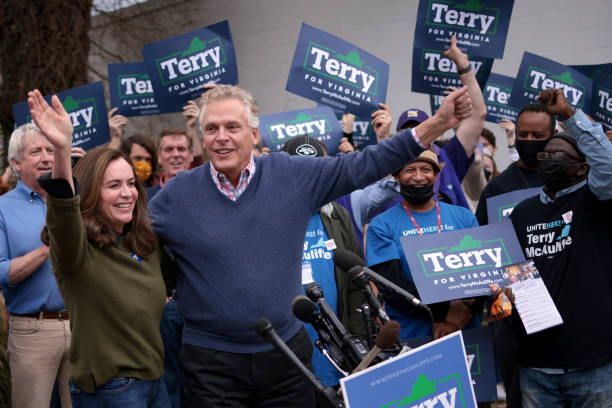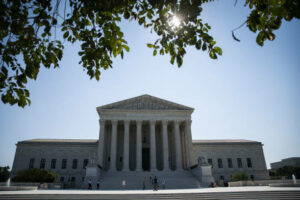The 2021 Gubernatorial Election in the Commonwealth of Virginia has turned into a landmark race that will have wide-ranging ramifications on the 2022 Midterm Elections. It pits the former Democratic Governor of the state, Terry McAuliffe, against Republican businessman and political newcomer Glenn Youngkin. A week ago, McAuliffe led the race by a very slim margin according to polling, around a 3-5 point advantage, though the most recent polling is showing some level of shift to Youngkin. However, most polling has McAuliffe’s lead within the margin of error, meaning a Youngkin win is still a distinct possibility. The race has garnered national attention as Virginia has trended blue in recent state and national elections.
Most political pundits do not even consider the Old Dominion a battleground state anymore. President Joe Biden recently trounced Donald Trump there in 2020, beating the incumbent President by more than ten points. However, with Trump out of the White House and Youngkin running a tight wire act campaign in regards to the aforementioned President, the race has been a lot closer than many would have expected. As the final days of the campaign wind down, let’s explore the race in its entirety and survey whether or not Virginia will elect a statewide Republican for the first time since 2009.
The Campaign Background
The state of Virginia represents just one of two Gubernatorial races that occur in off years, with the other being New Jersey. In 2021, a recall election also occurred in California for Governor, but was unplanned in nature. The race raised eyebrows early on as it figured to be the most competitive between the three off-year Gubernatorial races. The Democratic and Republican Primaries for Governor were competitive on both sides, as incumbents are forbidden from serving consecutive terms.
This is in fact why current Democratic Governor Ralph Northam can not run for reelection but former Governor McAuliffe can. On the Democratic side, progressive Lieutenant Governor Justin Fairfax, McAuliffe, and several other lower-profile Democrats ran for their party’s nomination. While McAuliffe ended up winning the race relatively comfortably, Fairfax and the others pushed the former Governor to the left as they tried to paint him as too moderate and out of touch with the wishes of progressive Virginians.
On the Republican side, former Carlyle Group (Private Equity Firm) CEO Glenn Youngkin won the nomination for Virginia’s Gubernatorial race. He beat out several candidates aligning themselves with former President Trump, including the chair of Mitt Romney’s unsuccessful 2012 campaign in Virginia, Pete Snyder. Youngkin branded himself as a Trump supporter while still having the ability to appeal to moderate and suburban Virginia voters. Trump did eventually end up endorsing Youngkin, which helped the businessman secure the nomination.
But just as with McAuliffe, the primary forced Youngkin towards the more partisan extremes of his party. Both candidates advanced to the General Election relatively unscathed in the end though, as the race’s closeness now shows. Also up for election in Virginia this year are races for Lieutenant Governor and Attorney General. Virginia delegate Hala Ayala (D) is facing off against former delegate Winsome Sears (R). And in the Attorney General’s race, Democratic incumbent Mark Herring is seeking a third term in office against Republican Delegate Jason Miyares, who currently represents parts of Virginia Beach.
The Current State of the Race
As mentioned, the Gubernatorial Race in Virginia is currently very close according to polling. The Cook Political Report recently moved the landmark contest from “lean Democratic” to “toss-up.” This should be an indication that there is indeed plenty of appetite in the state for a change of party. The reason for this is likely twofold. First, President Biden’s struggles during his first year have created a difficult political climate for Democrats all around the country.
Between rising Covid cases, a deadlock on infrastructure on Capitol Hill, and a chaotic withdrawal from Afghanistan, Democrats are finding it more and more difficult to simply run as “Joe Biden” acolytes. This is especially difficult for McAuliffe, as he has close ties to President Biden, as well as other establishment Democrats. McAuliffe previously campaigned with Biden earlier on in the campaign when the country was seemingly on a better track. Those days have not been seen since, but McAuliffe did say he would welcome Biden back to Virginia to campaign.
The other factor likely making the Virginia Gubernatorial race so close is Youngkin’s shrewd campaigning style. He has run a skillful campaign for a Republican candidate in a state that leans Democratic. Youngkin has continued to appear moderate and level-headed in order to appeal to suburban voters (especially those in Northern Virginia) which are absolutely necessary for any Republican to win the state. Additionally, he is able to appeal to hardcore Trump supporters by continuing to talk about issues such as election integrity.
Youngkin has said he seeks to appeal to all Republicans from die-hard Trump supports to never Trumpers, along with independents. It seems that his tightwire act of appealing to Trump base voters while not alienating suburban voters is working. Five ThirtyEight currently pegs the race at just a 2.5% lead for McAuliffe, well within the poll’s margin of error. It seems independents who do not currently have a candidate preference will likely decide the race.
On the campaign side of things, both McAuliffe and Youngkin have appealed to voters in very different ways. For McAuliffe, he has sought to promote his record as Governor as the main reason he should lead the state. Additionally, he has tried to tie his opponent to former President Trump at every turn. He often refers to Youngkin as a “Trump wannabe.” For the latter, Youngkin has tried to focus on economic issues such as the Virginia budget and school board related issues such as parental supervision over curriculum being taught in Virginia schools. Youngkin has specifically tried to tie himself to Trump as little as possible, rarely mentioning the former President. This is understandable considering how unpopular Trump is in Northern Virginia, an area Youngkin must do well in to win.
In two September debates for the candidates, McAuliffe and Youngkin mostly stuck to their aforementioned campaign strategies. The former talked up his record as the former Governor, highlighting the financial mismanagement he inherited from his Republican predecessor and how he created a budget surplus. Additionally, McAuliffe again tried to tie Youngkin to Trump as frequently as possible. For the latter, Youngkin focused on the jobs he created previously and argued he would do the same as Governor. He referred to himself on multiple occasions as the “jobs Governor.” Youngkin also sought to avoid mention of Trump and only reluctantly agreed that he would support him in 2024.
The Ramifications of a Youngkin Win
If Glenn Youngkin is triumphant in his underdog bid to represent Virginia as Governor, many subsequent consequences will arise. For starters, Virginia will once again be seen as a winnable target for Republicans running for statewide office. This means that future races will be more heavily invested in by state and national Republican organizations. On that point, two marque Senate races loom in the Old Dominion. Senator Tim Kaine is up for reelection in 2024 while his colleague Senator Mark Warner must run for re-election in 2026. While both of these races are years away, a GOP victory in any or all of the current offices up for election in Virginia would provide ample opportunity (and perhaps credible candidates) to run against the incumbent Senators.
In fact, it was not too long ago that Virginia had an extremely competitive Senate race. The race involved former Presidential Counsel Ed Gillespie challenging Mark Warner. Warner ended up winning the race by less than one point, making it the closest contest of the 2014 cycle. This recent history of a competitive statewide race combined with a difficult political climate that Democrats are currently dealing with could make future races in the state more winnable for Republicans, but only if Youngkin and his running mates are successful.
Another consequence of a GOP statewide win in Virginia would be on the national political climate. As it stands, Democrats are in potentially dire straits heading into the 2022 Midterm Elections. They have been unable to stop the scourge of Covid and are dealing with other crises including infrastructure and Afghanistan. A Youngkin win in Virginia would practically deflate the entire Democratic Caucus still hoping to hold onto the House of Representatives, Senate, and several battleground Governor’s races. The logic is pretty straightforward if a Republican is able to pull out a win in a reliably Democratic state.
How will the Democrats fare in other toss-up races or even lean blue races? As it stands, Democrats will need to defend their extremely slim House majority next year (only five seats), as well as several key Senate seats in states like Arizona, Georgia, Nevada, and New Hampshire. With a Republican win in Virginia, a huge amount of optimism and enthusiasm will likely propel Republicans to the polls who could eliminate the Democrats’ razor-thin majorities in both houses of Congress. This is not even to mention other Governor’s races, many of which will occur in battleground states such as Wisconsin.
The Old Dominion Outlook
The Gubernatorial race in Virginia is clearly a landmark contest with potentially wide-ranging ramifications. It will decide not only the future of the state but also potentially the future of control of Congress. Terry McAuliffe and Glenn Youngkin have run thoroughly divergent campaigns with one goal in mind, to win the governor’s mansion. McAuliffe has run on his experience as the former Governor while tying the Republican nominee to former President Trump.
Youngkin has sought to focus on the economy and jobs while steering clear of Trump. Both men have run skillful campaigns and both are now locked in a dead-heat that will surely be a nail-biter.
Main Photo:
Embed from Getty Images







